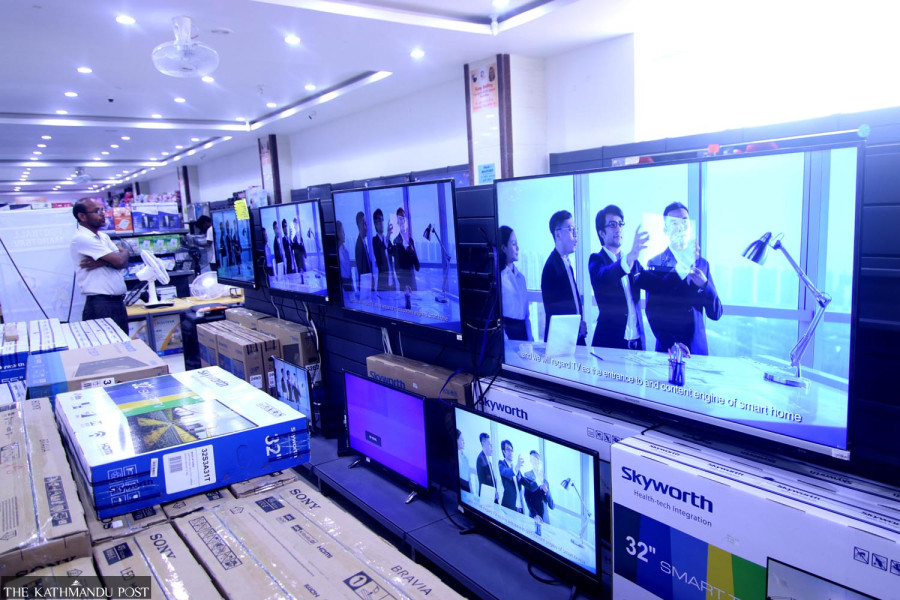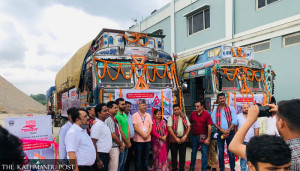Money
Festive season expected to boost economy
Traders report a marked rise in distributors visiting capital to place orders for goods.
Krishana Prasain
With the celebration of Janai Purnima on Monday, Nepal’s festive season has officially kicked off, and traders are hopeful that consumer demand will pick up, giving a much needed boost to the ailing economy.
As the country’s key festivals, Dashain, Tihar, and Chhath, approach, traders have started placing orders in foreign markets.
The festive season in Nepal traditionally sparks a significant surge in consumer spending, driving demand for everything from new clothes and jewellery to home appliances and vehicles, and propelling the retail and manufacturing sectors.
Local businesses launch massive sales campaigns. The festive season in Nepal is a perfect mixture of cultural celebration and economic activity.
The economic slowdown had dampened the festival season last year, but traders say they are optimistic this year.
While there is no official data on festival spending, economic activity in Nepal peaks during September-November.
Some economists estimate that 40 to 70 percent of market activities occur around these three key festivals.
It is estimated that many people save throughout the year to spend during these festivals.
Business houses, banks, and government officials receive bonuses for the festivals, and suppliers are keen to capitalise on the anticipated increase in demand.
Last Dashain, the cash crunch forced consumers to cut back on purchases. But this year, banks have sufficient liquidity, and traders are optimistic about sales growth.
Ramu Paudel, spokesperson at Nepal Rastra Bank, the country’s central bank, said that the trend of opening letters of credit (LC) to import goods ahead of the festive season has been promising.
“Based on this trend, we also expect a rise in international trade this year.”
Nepal's imports declined for two consecutive fiscal years, reversing several years of surging imports.
According to the central bank, merchandise imports decreased 1.2 percent to Rs1.59 trillion in the last fiscal year that ended mid-July, against a decrease of 16.1 percent a year ago.
Earlier, Nepal's imports declined by 7.2 percent in the fiscal year 2001-02.
The Post talked to a few traders about the demand outlook.
Automobile dealers are particularly optimistic and excited about this year’s festive sales.
“The automobile business slowed down after the pandemic. However, the growing demand for electric vehicles (EVs) has made us hopeful this year,” said Puskar Ojha, vice president of Nepal Automobile Dealers’ Association.
“The banks have enough liquidity and are ready to lend, especially for EVs. We hope EV sales will rise by 25 percent this festive season,” he said. EV sales cover 50-60 percent of the overall automobile market share.
The association is organising the NADA Auto Show 2024 from August 27 to September 1. The show is expected to draw 75,000 visitors.
“The new government has brought hope, and the market is also turning positive, so the overall sales of automobiles are expected to rise this festive season,” said Ojha.
Automobile traders said that new models and variants of two-wheelers and four-wheelers have started arriving in the market, targeting the auto show.
In the last fiscal year, Nepal’s gross foreign exchange reserves increased 32.6 percent to Rs2.04 trillion, a historic high fueled by remittance inflows of Rs1.44 trillion, the highest amount on record.
The distributors of consumer electronic goods are also optimistic and excited about extravagant festive sales.
Alok Gupta, general manager of Samsung Consumer Electronic Goods, said, “There is optimism in the market.”
“Observing the greening of the share market has given most businesses, including us, a sense of hope.”
He said they anticipated a 25 percent growth in consumer home appliance sales this festive season.
“There is a slowdown in market activities, but since banks have sufficient liquidity, it provides hope for all,” Gupta said.
According to Him Electronics, the authorised distributor of Samsung electronics goods in Nepal, the company is launching new TVs, refrigerators, and washing machines just in time for the Dashain. The new offers are expected to be introduced at the beginning of September.
“As we target 25 percent growth in sales, we plan for a good price offer to boost the sales. So, consumer electronic goods will not be expensive this festive season.”
Bharat Karki, vice president of Nepal Trans Himalaya Border Commerce Association, said that imports of readymade garments, raw materials for apparel and shoes, as well as mobile phones and accessories have risen by 40 percent this year, mainly targeted for the festival season.
“We have seen a rise in the number of distributors coming to Kathmandu and placing orders this year.”
“The demand may not reach the pre-Covid levels, but it’s improving.” He said 40 cargo containers enter Nepal daily from the northern border points, loaded with festive goods.
However, there are complaints from traders in New Road, once a major shopping hub.
Kumar Karki, president of the Federation of National Traders Nepal, said that businesses in New Road may face repercussions since the Kathmandu Metropolitan City has not allowed roadside parking.
“Shopper footfall has already dropped. Due to the parking restriction, we are not very optimistic about the upcoming festive sales.”
According to Nepal Rastra Bank, the country's readymade garment imports increased 35.9 percent to Rs33.26 billion in the last fiscal year. The inflation of clothes and footwear remained at 4.56 percent.




 23.12°C Kathmandu
23.12°C Kathmandu














